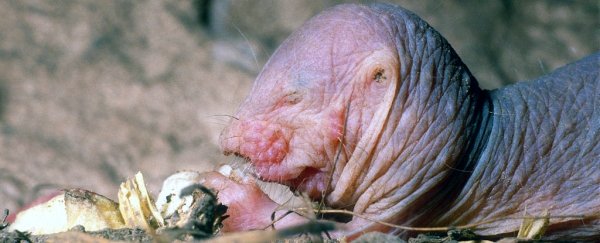Naked mole rats may look like wrinkly skin sacks, but they have some pretty bizarre superpowers, including a total immunity to cancer.
Now researchers have found that, apparently, these animals also don't age - their chances of dying do not increase as they get older.
For every other mammalian species, the risk of death continuously rises with the passage of time. But this doesn't happen for naked mole rats (Heterocephalus glaber), a species of rodent that burrows under the deserts of East Africa.
The mortality rate in mammals usually follows something called the Gompertz-Makeham law of mortality. This is a mathematical equation that describes the increase in mortality rate along with increase in age after reaching adulthood.
In humans, the risk roughly doubles every year after turning 30. But things are completely different for the wrinkly rodents.
"To me this is the most exciting data I've ever gotten," lead researcher Rochelle Buffenstein of Google's anti-ageing company Calico told Science. "It goes against everything we know in terms of mammalian biology."
Buffenstein has been studying naked mole rats for over 30 years, and has carefully documented every death of an animal in her care.
After studying the records of 3,299 naked mole rats, she has found that the risk of mortality remained at around one in 10,000 for the remainder of the rats' lives.
The naked mole rat reaches sexual maturity at six months of age. Based on their size, their expected lifespan in a lab is about 6 years. But some live to be over 30 years old, and even remain able to breed.
"Our research demonstrates that naked mole rats do not age in the same manner as other mammals, and in fact show little to no signs of ageing, and their risk of death does not increase even at 25 times past their time to reproductive maturity," Buffenstein said.
"These findings reinforce our belief that naked mole rats are exceptional animals to study to further our understanding of the biological mechanisms of longevity."
It's not known why naked mole rats are so good at living. A 2009 study proposed that there are several causes - stable proteins that unfold less than seen in mouse models, and less oxidation than is seen in other mammals.
Further research will need to be conducted in older animals to see if the trend continues past the age of 30.
The study has been published in the journal eLife.
